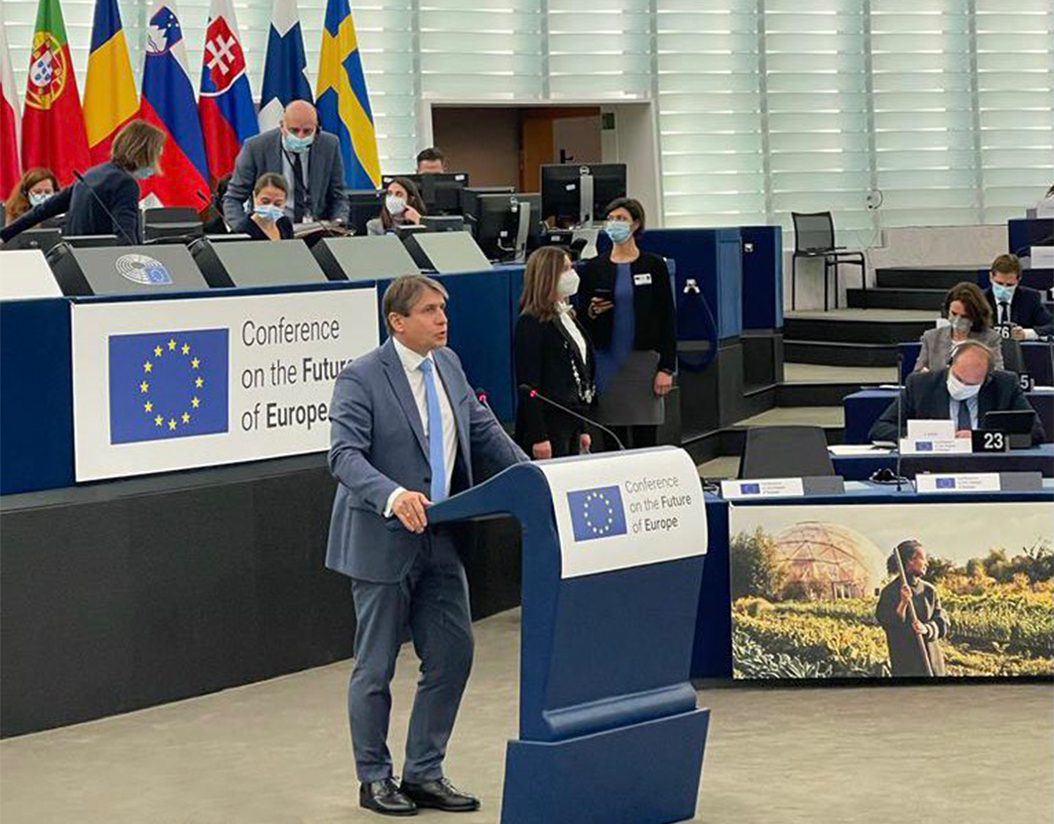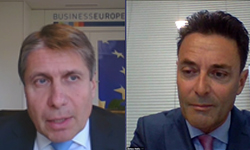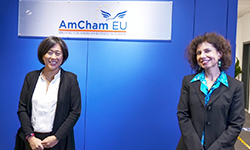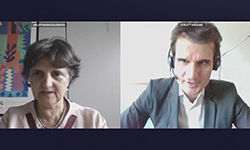BusinessEurope Headlines No. 2021-32
Conference on the Future of Europe: business messages

The second plenary of the Conference on the Future of Europe took place last weekend in Strasbourg. BusinessEurope’s Director General Markus J. Beyrer presented our recent paper on the Future of Europe to plenary members, the European People's Party and Renew groups and at various other meetings. Whilst welcoming the general objective of involving citizens more in the EU, Beyrer warned that our cherished European Way of Life is getting under increased pressure from systemic competitors around the world. If we want to maintain this special and unique model, we first need to get the economic framework right, he argued. Many societal objectives, be it social or environmental, can only be achieved when companies thrive and do what they do best: create growth, jobs and prosperity.
![]() Contact: Christian Feustel
Contact: Christian Feustel
Business expectations for COP26
Ahead of the COP26, Markus J. Beyrer, Director General of BusinessEurope, speaks about what European business expects from the conference.
10th anniversary of the European Forum of New Ideas in Sopot
 “There is only one chance if we want to play a role and be competitive in the world: Europe needs to stay together”, said BusinessEurope Director General Markus J. Beyrer at the European Forum for New Ideas (EFNI) in Sopot, Poland. “There are lot of challenges ahead and EFNI is a great place to discuss new ideas and the solutions for tomorrow. We, as BusinessEurope, congratulate you on this success story and are very proud to be a partner in this forum”, he added speaking at the opening gala of the 10th anniversary edition of the forum on 20 to 22 October. The event has been organised since 2011 by the Polish Confederation Lewiatan in cooperation with BusinessEurope. It gathers over a thousand participants from the world of business, science, culture and administration, Polish and European alike, and it is dedicated to global trends, new ideas and the future of Europe. Watch a video interview with DG Markus Beyrer.
“There is only one chance if we want to play a role and be competitive in the world: Europe needs to stay together”, said BusinessEurope Director General Markus J. Beyrer at the European Forum for New Ideas (EFNI) in Sopot, Poland. “There are lot of challenges ahead and EFNI is a great place to discuss new ideas and the solutions for tomorrow. We, as BusinessEurope, congratulate you on this success story and are very proud to be a partner in this forum”, he added speaking at the opening gala of the 10th anniversary edition of the forum on 20 to 22 October. The event has been organised since 2011 by the Polish Confederation Lewiatan in cooperation with BusinessEurope. It gathers over a thousand participants from the world of business, science, culture and administration, Polish and European alike, and it is dedicated to global trends, new ideas and the future of Europe. Watch a video interview with DG Markus Beyrer.
Contact: Asdin El Habbassi
Training funds have key role to play to improve training provision in Europe
 In the face of demographic ageing, there is no choice but to finally get to grip with the structural skills mismatch, which undermines the functioning of European labour markets for several decades. Access to a skilled workforce is a major precondition for successful companies. A fit for purpose and regularly updated training provision needs to be put in place in all EU Member States to enable workers to up and re-skill relative to new and emerging skills needs. 90% of job-related training in the EU is funded by employers. Their commitment and their positive role for skills development needs to be fully acknowledged and supported by the EU. Social partners also have a key role to play, jointly, in fostering training provision and participation. In particular, training funds, managed by social partners, are an effective way to provide training in response to identified needs at national and sectoral level. These were key messages given by BusinessEurope Director General Markus J. Beyrer during a joint seminar on training policies that was organised by BusinessEurope and the Employers Group in the European Economic and Social Committee on 27 October. In the context of the European Commission’s expected proposal for a Council Recommendation on individual learning accounts (ILAs) in December, BusinessEurope believes that such an individualised approach is not the answer to improving training provision. ILAs could weaken the association between the financing and content of training provision thereby potentially resulting in training being less job-oriented and consequently less responsive to employers’ needs. The recent tripartite opinion of the Advisory Committee on Vocational Training on ILAs and training provision highlighted that ILAs are only one possible means of providing training and that greater emphasis should be put on the development and strengthening of training funds.
In the face of demographic ageing, there is no choice but to finally get to grip with the structural skills mismatch, which undermines the functioning of European labour markets for several decades. Access to a skilled workforce is a major precondition for successful companies. A fit for purpose and regularly updated training provision needs to be put in place in all EU Member States to enable workers to up and re-skill relative to new and emerging skills needs. 90% of job-related training in the EU is funded by employers. Their commitment and their positive role for skills development needs to be fully acknowledged and supported by the EU. Social partners also have a key role to play, jointly, in fostering training provision and participation. In particular, training funds, managed by social partners, are an effective way to provide training in response to identified needs at national and sectoral level. These were key messages given by BusinessEurope Director General Markus J. Beyrer during a joint seminar on training policies that was organised by BusinessEurope and the Employers Group in the European Economic and Social Committee on 27 October. In the context of the European Commission’s expected proposal for a Council Recommendation on individual learning accounts (ILAs) in December, BusinessEurope believes that such an individualised approach is not the answer to improving training provision. ILAs could weaken the association between the financing and content of training provision thereby potentially resulting in training being less job-oriented and consequently less responsive to employers’ needs. The recent tripartite opinion of the Advisory Committee on Vocational Training on ILAs and training provision highlighted that ILAs are only one possible means of providing training and that greater emphasis should be put on the development and strengthening of training funds.
Contact: Robert Plummer
A holistic approach is needed on EU investment policy
 “Investment policy cannot be seen in isolation. To remain a world leader, the EU needs a pro-competitiveness and pro-investment legal framework in a broad range of areas, from customs procedures to deepening single market”, argued Luisa Santos, Deputy Director General of BusinessEurope in a public hearing on investment organised by the European Parliament’s International Trade (INTA) Committee on 26 October. She added that to ensure its leadership coming out of the COVID-19 pandemic and in the context of the digital and green transformations, the EU must remain an open and attractive investment destination. At the same time, a successful EU investment policy must also seek to level the playing field for EU investors globally. Trade and investment agreements are key not only in defining the framework – the conditions and the areas – in which investments can take place, but also in ensuring enforcement of these rules and the settlement of disputes when they occur. While in general European investors have better access to investment opportunities abroad, enforcing their rights is not a given. This is an area of mixed competence, causing significant delays in the ratification of agreements, despite the efforts of the EU to modernise the system of the settlement of disputes between investors and states. This puts into question the credibility of the EU. Overall, from a European business perspective, it is important that investment policy is seen in a holistic manner, ensuring better coordination and alignment between the internal and the external pillars of the policy.
“Investment policy cannot be seen in isolation. To remain a world leader, the EU needs a pro-competitiveness and pro-investment legal framework in a broad range of areas, from customs procedures to deepening single market”, argued Luisa Santos, Deputy Director General of BusinessEurope in a public hearing on investment organised by the European Parliament’s International Trade (INTA) Committee on 26 October. She added that to ensure its leadership coming out of the COVID-19 pandemic and in the context of the digital and green transformations, the EU must remain an open and attractive investment destination. At the same time, a successful EU investment policy must also seek to level the playing field for EU investors globally. Trade and investment agreements are key not only in defining the framework – the conditions and the areas – in which investments can take place, but also in ensuring enforcement of these rules and the settlement of disputes when they occur. While in general European investors have better access to investment opportunities abroad, enforcing their rights is not a given. This is an area of mixed competence, causing significant delays in the ratification of agreements, despite the efforts of the EU to modernise the system of the settlement of disputes between investors and states. This puts into question the credibility of the EU. Overall, from a European business perspective, it is important that investment policy is seen in a holistic manner, ensuring better coordination and alignment between the internal and the external pillars of the policy.
Contact: Sofia Bournou
EU-USA: addressing existing conflicts is key to building a positive agenda
 “Business on both sides of the Atlantic is committed to contributing to a positive agenda for EU-US cooperation through the Trade and Technology Council. To build on this positive momentum it is important to urgently address existing trade tensions. In particular, we need to agree on a solution to the steel and aluminium additional duties that are negatively impacting companies in Europe and in the USA”, said Luisa Santos, Deputy Director General of BusinessEurope, in a meeting organised by AmChamEU with the US Trade Representative Ambassador Katherine Tai. The meeting was also an opportunity to signal the importance of having a positive outcome of the World Trade Organisation (WTO) ministerial meeting (MC12) that will take place in Geneva later in the year. Santos highlighted it is important that both the EU and the USA work together for a successful outcome in the MC12 and open the path for the WTO reform. “One concrete action would be to resume the trilateral discussions on industrial subsidies, also involving Japan, and agree on a concrete proposal that could also be shared and discussed with other WTO members”, she said.
“Business on both sides of the Atlantic is committed to contributing to a positive agenda for EU-US cooperation through the Trade and Technology Council. To build on this positive momentum it is important to urgently address existing trade tensions. In particular, we need to agree on a solution to the steel and aluminium additional duties that are negatively impacting companies in Europe and in the USA”, said Luisa Santos, Deputy Director General of BusinessEurope, in a meeting organised by AmChamEU with the US Trade Representative Ambassador Katherine Tai. The meeting was also an opportunity to signal the importance of having a positive outcome of the World Trade Organisation (WTO) ministerial meeting (MC12) that will take place in Geneva later in the year. Santos highlighted it is important that both the EU and the USA work together for a successful outcome in the MC12 and open the path for the WTO reform. “One concrete action would be to resume the trilateral discussions on industrial subsidies, also involving Japan, and agree on a concrete proposal that could also be shared and discussed with other WTO members”, she said.
Contacts: Luisa Santos and Eleonora Catella
Business support is critical for a successful WTO Ministerial Conference
 On 21 October, the Deputy Director General of the World Trade Organisation (WTO) Ambassador Jean-Marie Paugam visited BusinessEurope with a strong call to support the multilateral trading system ahead of the 12th WTO Ministerial Conference (MC12) taking place from 30 November to 3 December 2021. He shared the outline of potential MC12 deliverables, which will aim at setting the system back in motion. In terms of multilateral results, an agreement on fisheries subsidies would deliver new rules but also demonstrate the role that trade and the WTO can play to achieve sustainability objectives. Moreover, an outcome on trade and health would be key to show how the WTO delivers for people, helping to build trust in the system and resilience in times of crises. When it comes to the plurilateral agenda, it is expected that an agreement on domestic regulation in services will be concluded during the MC12, while members will take stock of progress achieved in other initiatives, including the e-commerce negotiations, which are very important for business. It is worth noting that a basket of plurilateral initiatives in the area of the environment is emerging, namely on plastics, fossil fuel subsidy reform and, more broadly, trade and sustainable development. Finally, it is anticipated that during the MC12, members formally launch the process of WTO reform. BusinessEurope, committed to supporting an ambitious yet pragmatic multilateral trade agenda, will step up its engagement activities ahead of the MC12.
On 21 October, the Deputy Director General of the World Trade Organisation (WTO) Ambassador Jean-Marie Paugam visited BusinessEurope with a strong call to support the multilateral trading system ahead of the 12th WTO Ministerial Conference (MC12) taking place from 30 November to 3 December 2021. He shared the outline of potential MC12 deliverables, which will aim at setting the system back in motion. In terms of multilateral results, an agreement on fisheries subsidies would deliver new rules but also demonstrate the role that trade and the WTO can play to achieve sustainability objectives. Moreover, an outcome on trade and health would be key to show how the WTO delivers for people, helping to build trust in the system and resilience in times of crises. When it comes to the plurilateral agenda, it is expected that an agreement on domestic regulation in services will be concluded during the MC12, while members will take stock of progress achieved in other initiatives, including the e-commerce negotiations, which are very important for business. It is worth noting that a basket of plurilateral initiatives in the area of the environment is emerging, namely on plastics, fossil fuel subsidy reform and, more broadly, trade and sustainable development. Finally, it is anticipated that during the MC12, members formally launch the process of WTO reform. BusinessEurope, committed to supporting an ambitious yet pragmatic multilateral trade agenda, will step up its engagement activities ahead of the MC12.
Contacts: Sofia Bournou, Elena Suárez
Artificial Intelligence Act: achieving trust while enabling excellence
 Artificial Intelligence (AI) can strategically support Europe and help us answer many societal challenges that we are facing. The potential for Europe to derive these benefits will rely on the abilities for companies to research, test, have a skilled workforce, a vibrant data economy, appropriate infrastructure and a beneficial framework to exist within. This week BusinessEurope adopted its position paper laying out business recommendations and priorities on the European Commission’s proposal for a regulation providing harmonised rules on Artificial Intelligence (the Artificial Intelligence Act - AIA). We welcome the risk-based approach outlined in the Artificial Intelligence Act. This is a pragmatic start to achieve trust and excellence while enabling early AI development to flourish. Nevertheless, we believe that certain aspects of the proposal need to be amended and clarified to ensure a future-proof, proportionate and legally certain framework. Read our full position here.
Artificial Intelligence (AI) can strategically support Europe and help us answer many societal challenges that we are facing. The potential for Europe to derive these benefits will rely on the abilities for companies to research, test, have a skilled workforce, a vibrant data economy, appropriate infrastructure and a beneficial framework to exist within. This week BusinessEurope adopted its position paper laying out business recommendations and priorities on the European Commission’s proposal for a regulation providing harmonised rules on Artificial Intelligence (the Artificial Intelligence Act - AIA). We welcome the risk-based approach outlined in the Artificial Intelligence Act. This is a pragmatic start to achieve trust and excellence while enabling early AI development to flourish. Nevertheless, we believe that certain aspects of the proposal need to be amended and clarified to ensure a future-proof, proportionate and legally certain framework. Read our full position here.
![]() Contact: Adnane Lachheb
Contact: Adnane Lachheb
European social partners digitalisation agreement: implementation discussed
 The European Social Partners Framework Agreement on digitalisation in the world of work provides a great opportunity to jointly manage this transition in an effective way for employers and workers. This was a key message coming out of the joint BusinessEurope, SGIeurope and SMEunited seminar on the implementation of the agreement on 26 October. Employers took inspiration from national and company level examples on how to join forces with trade unions to devise concrete actions to implement the agreement. The seminar focused in particular on the jointly managed process, which is part of the agreement, and on the specific topic of modalities for connecting and disconnecting. The seminar also facilitated mutual learning on the different tools available to social partners and how to tailor these to the specific national, sectoral or company situation in line with diverse national industrial relations practices. Participants also welcomed the digital tool and outreach activities due to be developed in the coming years jointly by the European social partners to support implementation.
The European Social Partners Framework Agreement on digitalisation in the world of work provides a great opportunity to jointly manage this transition in an effective way for employers and workers. This was a key message coming out of the joint BusinessEurope, SGIeurope and SMEunited seminar on the implementation of the agreement on 26 October. Employers took inspiration from national and company level examples on how to join forces with trade unions to devise concrete actions to implement the agreement. The seminar focused in particular on the jointly managed process, which is part of the agreement, and on the specific topic of modalities for connecting and disconnecting. The seminar also facilitated mutual learning on the different tools available to social partners and how to tailor these to the specific national, sectoral or company situation in line with diverse national industrial relations practices. Participants also welcomed the digital tool and outreach activities due to be developed in the coming years jointly by the European social partners to support implementation.
Contact: Rebekah Smith
Greening of the economy: towards priorities on employment and social aspects
 The green transition will have serious consequences at the local, regional and sectoral level. Well-thought-out investment and reforms of active labour market policies, education and training and social protection systems are conditions for making it a success. Since these areas are competences of EU Member States, the European Semester can be an effective process to coordinate national efforts. Employers are ready to have a positive contribution to this process of change, but need a targeted support. Companies’ adaptation to greener production realities needs to be supported by public support mechanisms, notably in the context of national recovery and resilience plans. Availability of private financing options, such as sustainable finance opportunities, can also play a positive role for additional private investment. The announced European Commission’s proposal for a Council recommendation on employment and social aspects of greening should also fully recognise that different sectors of the economy need tailored solutions to deal with the impact of the green transition on their diverse employment and skills needs. Social partners have an important role in this process, notably to contribute to improving training provision and through their collective bargaining at the appropriate levels. These were the main messages of Maxime Cerutti, BusinessEurope Social Affairs Director, passed to the European Commission during the dedicated hearing on social and employment aspects of the climate transition on 22 October.
The green transition will have serious consequences at the local, regional and sectoral level. Well-thought-out investment and reforms of active labour market policies, education and training and social protection systems are conditions for making it a success. Since these areas are competences of EU Member States, the European Semester can be an effective process to coordinate national efforts. Employers are ready to have a positive contribution to this process of change, but need a targeted support. Companies’ adaptation to greener production realities needs to be supported by public support mechanisms, notably in the context of national recovery and resilience plans. Availability of private financing options, such as sustainable finance opportunities, can also play a positive role for additional private investment. The announced European Commission’s proposal for a Council recommendation on employment and social aspects of greening should also fully recognise that different sectors of the economy need tailored solutions to deal with the impact of the green transition on their diverse employment and skills needs. Social partners have an important role in this process, notably to contribute to improving training provision and through their collective bargaining at the appropriate levels. These were the main messages of Maxime Cerutti, BusinessEurope Social Affairs Director, passed to the European Commission during the dedicated hearing on social and employment aspects of the climate transition on 22 October.
![]() Contact Anna Kwiatkiewicz-Mory
Contact Anna Kwiatkiewicz-Mory
Discussing international corporate tax reform with European Commission
 The 8 October agreement at the Organisation for Economic Co-operation and Development (OECD) is a major milestone for the international corporate tax framework and we look forward to a successful global harmonised implementation in the following years. This was the key message of BusinessEurope’s Tax Policy Group when it welcomed Bert Zuijdendorp, Head of Company Taxation initiatives at the Directorate General for Taxation and Customs Union (DG TAXUD), to its meeting on 27 October. In light of the recent global agreement, the group discussed the approaching implementation of the OECD agreement at EU level and stressed in particular the importance of a harmonised implementation to ensure a global level playing field for European companies. The group also expressed its concerns around the pending proposal for a digital levy, which could still endanger future prospects for the swift agreement of the global tax deal.
The 8 October agreement at the Organisation for Economic Co-operation and Development (OECD) is a major milestone for the international corporate tax framework and we look forward to a successful global harmonised implementation in the following years. This was the key message of BusinessEurope’s Tax Policy Group when it welcomed Bert Zuijdendorp, Head of Company Taxation initiatives at the Directorate General for Taxation and Customs Union (DG TAXUD), to its meeting on 27 October. In light of the recent global agreement, the group discussed the approaching implementation of the OECD agreement at EU level and stressed in particular the importance of a harmonised implementation to ensure a global level playing field for European companies. The group also expressed its concerns around the pending proposal for a digital levy, which could still endanger future prospects for the swift agreement of the global tax deal.
Contact: Pieter Baert
Calendar 
- 31 October - 12 November: United Nations Climate Change Conference (COP26)
- 4 November: 23rd EU-Japan Business Round Table
- 6 November: BusinessEurope's COP26 side event - The role of policy framework, standards & support tools for businesses to become climate-neutral
- 15-17 November: SME Assembly 2021
Not yet a subscriber? Register here.
Reminder: please have a look at our privacy policy